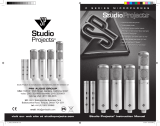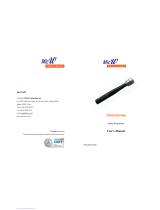
STUDIO CONDENSER MICROPHONES C‑4
Low cut-lter and signal level attenuation (−10 dB)
3
Pickup patterns4.
Both microphones feature a capsule with a cardioid pickup pattern. Micro-
phones with this polar pattern are most sensitive to sound coming from in
front of the microphone, and also to a lesser extent from the sides. Sound
coming from behind the microphone will be greatly attenuated. This makes
the cardioid polar pattern most suitable for recording individual instruments
or vocals within a group.
The so-called proximity effect is typical for microphones with the cardioid
pickup pattern. Depending on the distance between the microphone and
the sound source, a slight increase in the lower frequency range occurs.
The shorter the distance, the more pronounced this effect. By cleverly se-
lecting the position and the angle of your microphone, you can effectively
manipulate the proximity effect and thus affect how your recording sounds.
Experiment with various positions in order to gain more experience.
Possible applications5.
Both microphones have been matched to one another (matched pair).
Therefore, they are particularly well-suited for stereo recordings. Regardless
of whether you are miking an entire ensemble or a single sound source (e.g.
drums, piano or background vocals), this pair of condenser microphones lets
you achieve outstanding spatial impressions in every recording session.
Of course, you can use your microphones individually as well. A cardioid
pattern capsule is often used in recording situations in which several sound
sources are present. Since this capsule selectively tones down the pickup
of sounds located to the side of the microphone, this way you can achieve
good separation of sound sources, thus easily avoiding feedback.
Low cut-lter and signal level attenuation (−10 dB)6.
The C-4 studio microphones feature a switchable low-cut lter that lets
you eliminate low-frequency disturbances such as subsonic noise. Set the
switch to its middle position to activate the low-cut lter.
A switchable level attenuation is provided on your C-4s for applications
in which the microphones are exposed to extremely high sound pres-
sures. When the switch is in its “−10 dB” position, the level attenuation
is activated.
When the switch is in its top-most position, the signal is not inuenced in
any way.







